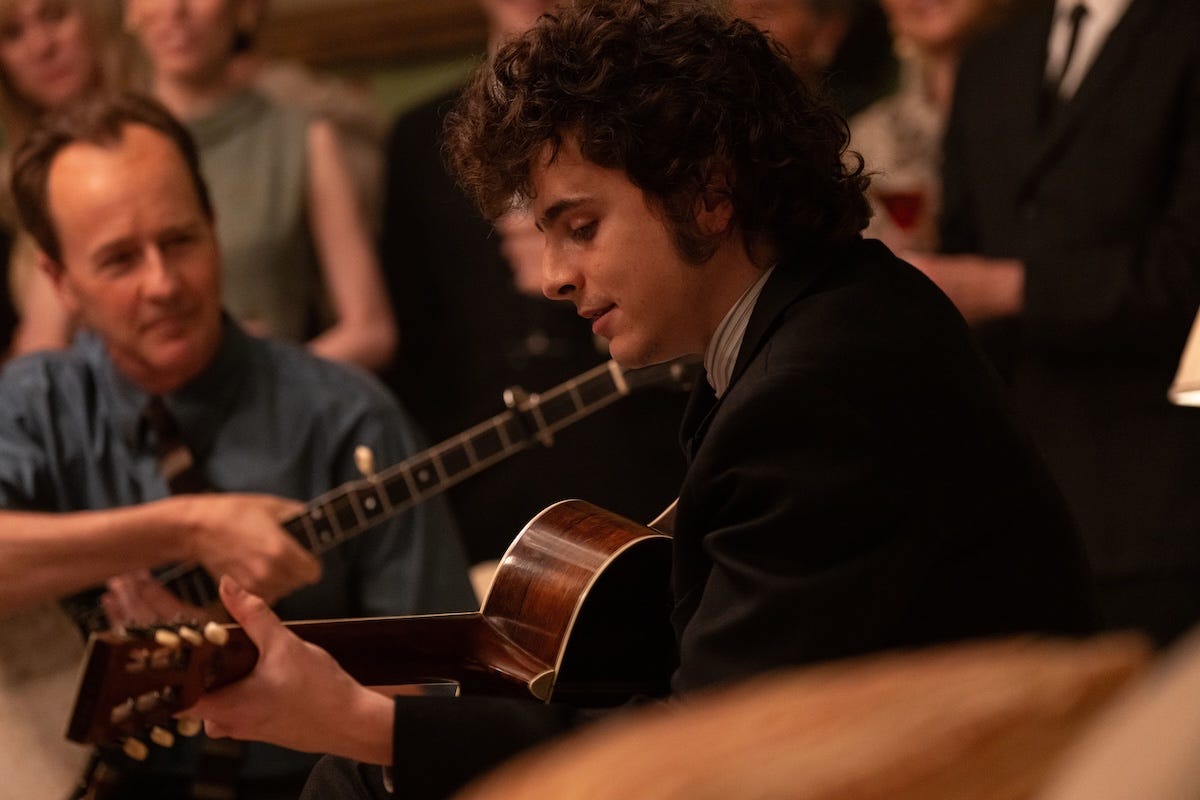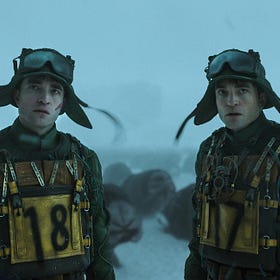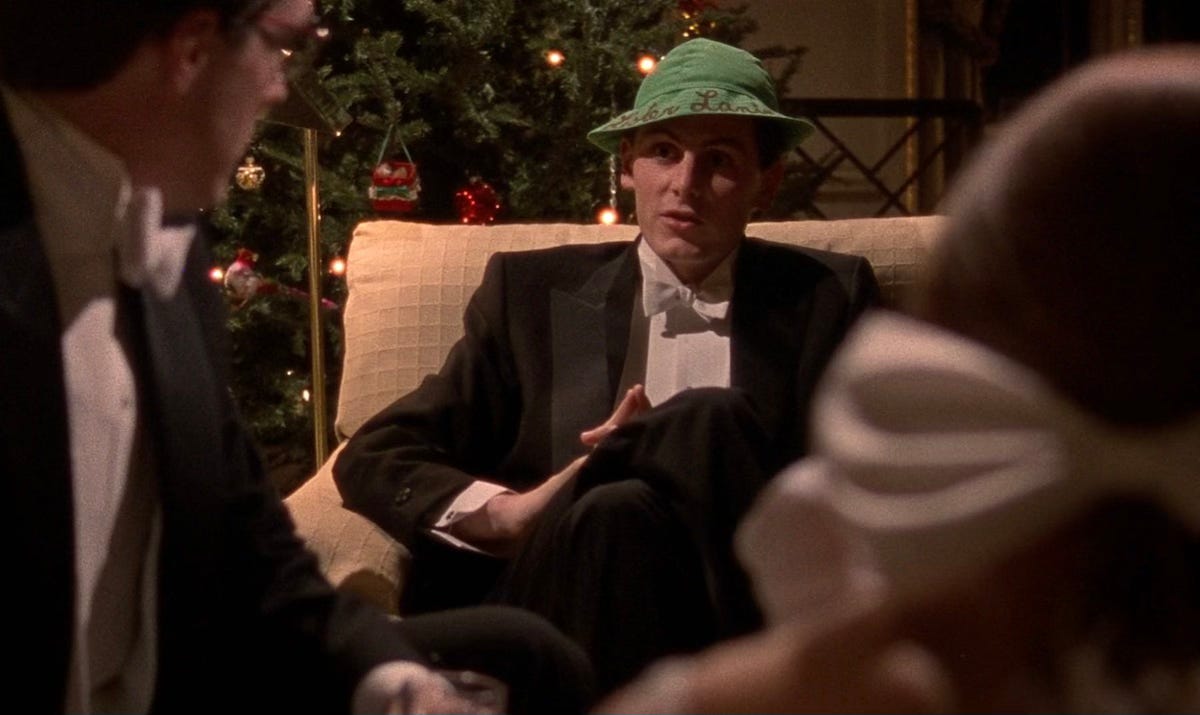There’s something pleasing about a good old-fashioned musical biopic, like throwing on a comfy sweater and listening to a classic album while the day’s cares melt away. People love watching simulations of their favorite musicians singing their classic songs in a way that also allows them to see their heroes as underdogs struggling against either social norms or overbearing authority figures in the business world.
It’s why, despite film critics’ claims to the contrary, Walk Hard: The Dewey Cox Story simply couldn’t kill the genre despite laying out, beat by beat, precisely how the biopic (and particularly the musical biopic) works. If you’ve never seen Walk Hard, starring John C. Reilly as the fictional musician Dewey Cox, you should; it’s a treat. Coming on the heels of Ray (2004) and Walk the Line (2005), Jake Kasdan’s 2007 comedy feels a bit like a screenwriting seminar in cinematic form. He takes us beat by beat through the structure shared by many such movies—rough childhood; youthful talent; commercial success; drug-induced, Icarus-like downfall; culminating in a love-inspired, phoenix-like rebirth—and does so with cutting humor.
Here’s the thing: audiences don’t care. Whether or not they should care, they don’t. There’s a reason Bohemian Rhapsody grossed more than $900 million worldwide, won a bunch of Oscars, and has a stellar IMDB rating despite being formulaic claptrap: audiences love their formulas. And they love watching simulations of their favorite musicians singing their classic songs.
A Complete Unknown doesn’t quite hit the Walk Hard formula beat for beat—Bob Dylan never publicly struggled with addiction, though in some interviews he has suggested having a heroin habit in the 1960s—but it’s close enough for government work. And it doesn’t really matter: James Mangold’s film is handsomely shot, well-acted, and features, you guessed it, simulations of some of our favorite musicians singing their classic songs. People are gonna love it.
Bob Dylan (Timothée Chalamet) hitchhikes into New York City from the wilds of Minnesota before wowing Stalinist Pete Seeger (Edward Norton) and a hospital-ridden Woody Guthrie (Scoot McNairy) with an original, folksy bedside ode to Guthrie. Seeger takes Dylan under his wing, bringing him home and taking him around town to meet record execs and other folkies, including the great Joan Baez (Monica Barbaro); Dylan’s artistic and romantic partnership with Baez renders rocky his relationship with Sylvie Russo (Elle Fanning), a sweet girl who spends much of the film confused about the cipher she is on-and-off-again dating.
As Dylan’s fame explodes and his own artistic impulses hurtle toward going electric—a big no-no in the folk scene, as anyone who has heard of his infamous performance at the 1965 Newport Folk Festival can attest—he racks up a number of interesting acquaintances, including pen pal Johnny Cash (Boyd Holbrook). But none of these people, famous or not, can quite pin down what makes Dylan tick.
Chalamet is too pretty to play Dylan, but he excels in the role anyway because he skillfully animates—via mumbled asides and wry smiles and the occasional furrowed brow—what makes Dylan difficult to pin down. I am far from a Dylanologist, so take everything I say here with a grain of salt, but one of the things that’s always been intriguing to me about the man is his reluctance to have labels—artistic or political—pinned to his chest. He sings what he believes and he makes music he wants to hear; he doesn’t take orders and he isn’t particularly interested in catering to the crowd, any crowd. The whole middle of the film sees him struggling with these impulses, from refusing to play “Blowin’ in the Wind” with Joan Baez on their joint tour despite the audience howling for it to his growing annoyance with the activist set that had embraced him to, yes, that moment when he “went electric.”
The performances throughout are great; Holbrook is getting a lot of love for his comic-drunk Johnny Cash, and for good reason, and Barbaro and Fanning also convincingly portray the annoyance of having to deal with a real-world asshole who is too flighty to know what he truly wants from either of them. Or both, at the same time. My favorite performance in the film, though, may be Dan Fogler’s turn as Albert Grossman, a high-profile manager on the folk scene who quickly realizes Dylan’s a genius, gloms on to his talent, and then defends him from the folk sticklers who resent Dylan’s move into rock and roll.
A Complete Unknown hits all the right notes, though it feels more competent than transcendent at least partly because, as the title acknowledges, Dylan himself is almost unknowable. He’s like the trickster god of the folk set, spinning his own creation myths while setting the sun on the whole scene. There’s no real lesson to be learned about Bob Dylan here, no great revelation about him or his character or his time.
But “Like a Rolling Stone” is a great song, and when that Hammond organ hits its opening note you can’t help but grin. That’s enough for me, and it’s probably enough for most of you too.
Make sure to check out Across the Movie Aisle’s bonus episode today looking forward to 2025. We’re not quite done with 2024 yet, but a new year quickly approaches:
Looking Ahead to 2025
What is the team looking forward to next year? Lots of good stuff on the horizon!
And if you can’t listen to that but want to because it’s only for subscribers, hit that button below.
Links!
The U.S. Military-Industrial-Entertainment Complex kept on winning this week, awarding Tom Cruise with its top civilian honor for his work promoting the Navy on the big screen. You love to see it!
Speaking of which, the trailer for Alex Garland’s next film, Warfare, is pretty intense and great.
I guess that’s the second-biggest trailer of the week after the new Superman teaser:
I’m very curious to see how this film is received. There’s … a lot going on in it! Including the worst Green Lantern of all time, Guy Gardner!
Netflix made an AI version of Christopher Nolan say nice things about Netflix, which is one of the wildest sentences I’ve ever written. The future is dumber than we possibly could have imagined.
Long unavailable on digital, 28 Days Later is back. I’m hoping for a Blu-ray release closer to the release of the sequel, 28 Years Later.
Assigned Viewing: Metropolitan (Criterion Channel/Max)
It’s that time of year! I watch it every Christmas season and it just gets better. (Particularly if you are, as the AP suggested earlier this week, in a mood to feel fancy.) One thing that jumped out this time, near the end, is when the titled jerk Rick von Sloneker says to our heroes “This is my place—I can do whatever I want,” Tom’s reply is “That’s not true.” He doesn’t say “no you can’t,” he says “that’s not true,” implying that there’s a deeper, more spiritual, verity underpinning the assertion. Or maybe I’m overthinking things! But if you’re going to overthink anything, it might as well be Metropolitan.






I'd wager that I'm probably the biggest Dylan head that follows The Bulwark. Am super pumped about this movie and am happy to read your positive review of it.
Excellent review of the movie, which I'm even more eager to see now. That said, there's nothing like a little gratuitous jab at Pete Seeger to remind me I am in a center-right space. :-) (The Atlantic piece is actually pretty fair to ol' Pete. People should read it.)